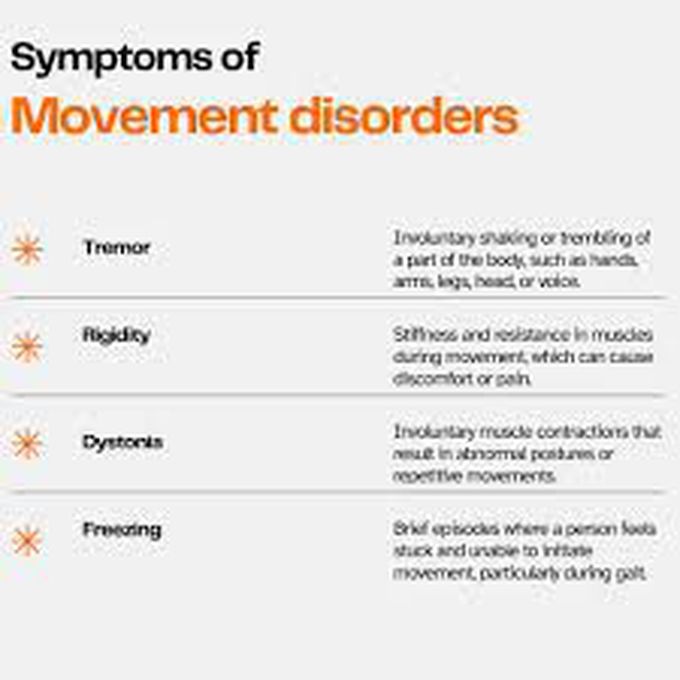


Symptoms of movement disorders
Symptoms of movement disorders vary depending on the type of the disorder. Common types of movement disorders and their symptoms include: Ataxia. Ataxia affects the part of the brain that controls coordinated movement. Ataxia may cause clumsy movements of the arms and legs, and a loss of balance. Ataxia also can change a person's speech and cause other symptoms. There are many causes of ataxia, including genetic and degenerative conditions. Ataxia also may be caused by an infection or another treatable condition. Chorea. Chorea causes brief, irregular, somewhat rapid, involuntary movements that happen over and over. The movements typically involve the face, mouth, trunk, arm and leg. Chorea can look like exaggerated fidgeting. The most common genetic chorea is Huntington's disease. This disease is passed down from a parent and gets worse over time. It can be confirmed with genetic testing. Huntington's disease has three types of symptoms. They include movements that can't be controlled, trouble with thinking and mental health conditions. Dystonia. This condition involves involuntary muscle contractions that cause twisting, irregular postures, or movements that occur again and again. Dystonia may affect the entire body or one part of the body. The most common type of dystonia in adults is cervical dystonia. In cervical dystonia, the neck muscles contract involuntarily. This causes the head to pull to one side or to tilt forward or backward. The head also may shake, known as a tremor. Functional movement disorder. This condition may look like any of the movement disorders. But it's not caused by a disease of the nervous system, also known as a neurological disease. Functional movement disorders are treatable. Multiple system atrophy. This rare condition affects many brain systems and gets worse over time. Multiple system atrophy causes a movement disorder, such as ataxia or parkinsonism. It also can cause low blood pressure, bladder symptoms and acting out dreams. Myoclonus. Myoclonus are very quick jerks of a muscle. Parkinson's disease. Parkinson's disease causes tremors, muscle stiffness, slow or decreased movement, or loss of balance. It also can cause symptoms not related to movement. These symptoms include a reduced sense of smell, constipation, acting out dreams and a decline in thinking skills. Parkinson's disease slowly gets worse over time. Parkinsonism. Parkinsonism is a general term for slowness of movement along with stiffness, tremors or loss of balance. There are many different causes. Parkinson's disease and certain dopamine blocking medicines are the most common causes. Other causes include degenerative disorders such as multiple system atrophy and progressive supranuclear palsy. Stroke or repeated head trauma also can cause parkinsonism. Progressive supranuclear palsy. This is a rare nervous system condition that causes problems with walking, balance and eye movements. It may resemble Parkinson's disease but is a distinct condition. Restless legs syndrome. This movement disorder causes aching, itching, or creeping feelings in the legs while relaxing or lying down. The feeling often goes away with movement. Tardive dyskinesia. This neurological condition is caused by long-term use of certain medicines used to treat mental health conditions, called neuroleptic medicines. It also can be caused by a common gastrointestinal medicine called metoclopramide (Reglan, Gimoti). Tardive dyskinesia causes involuntary movements that occur over and over. Symptoms include grimacing, eye blinking and other movements. Tourette syndrome. This is a neurological condition associated with repetitive movements and vocal sounds called tics. Tics are voluntary movements, but they're caused by an involuntary urge to make the movements. Tourette syndrome starts between childhood and teenage years. Tremor. This movement disorder causes rhythmic shaking of parts of the body, such as the hands, head or other body parts. The most common type is essential tremor.
I’ve been living with Parkinson’s disease for quite some time, and for years, I struggled to find lasting relief. While medications offered some temporary help, the symptoms always returned and often worsened.Out of a mix of hope and hesitation, I decided to try an herbal treatment program from NaturePath Herbal Clinic. I’ll admit, I was skeptical at first. But around the fourth month, I began to notice real, steady progress.my tremors became less frequent the stiffness in my body eased My balance and coordination gradually improved It wasn’t an overnight transformation, but it was consistent and life changing. For the first time in years, I feel more in control of my body. I can move with greater freedom, sleep more peacefully, and enjoy daily activities without the constant discomfort I once accepted as normal.The improvement I’ve experienced physically, emotionally, and mentally has been nothing short of upliftings.If you're exploring natural options for managing Parkinson’s, I wholeheartedly recommend looking into NaturePath Herbal Clinic. Their approach has made a real difference in my life, and I’m truly grateful I gave it a chance. www.naturepathherbalclinic.com info@naturepathherbalclinic.com


